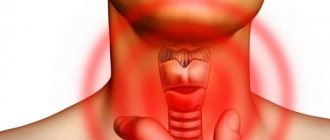Why is a blood test necessary?
Hormone levels in a woman over 45 years of age begin to change in the other direction. Of course, for a woman of reproductive age this can be considered an anomaly, but during the premenopausal period, changes in basic hormonal indicators are the norm. As a result of the body's restructuring in a new way, the level of some substances will increase, while others will fall. This once again indicates that reproductive function is fading, which means that estrogens and progestins are no longer in the same quantities as they were before.
The production of hormones in a woman’s body is regulated by the most hidden structure of the brain – the pituitary gland. It is he who is responsible for normal hormonal levels during childbearing years. And at the beginning of the cycle, under its influence, the level of follicle-stimulating substance increases, which provokes the maturation of eggs. In the middle of the cycle, the pituitary gland shifts its activity to the production of luteinizing hormone and progesterone - under the influence of these substances, ovulation begins and the egg becomes ready for contact with the sperm.
During menopause, such processes do not occur, which means the level of substances will be different. It is for this reason that doctors consider hormone tests during menopause to be the most reliable signs of the onset of menopause. All women who complain about health over the age of 45-50 years old take this test.
Hormonal therapy for menopause: how to choose?
Friends, we continue to publish about hormone replacement therapy for menopause. You can read the first part here.
Menopausal hormone therapy (MHT) is a method of treating menopausal syndrome and a full part of the strategy for preserving women's health.
With severe menopausal symptoms, it is very difficult to “be patient”, and herbs and dietary supplements, as a rule, help for only 2-3 months.
However, this does not mean that hormonal therapy is a new panacea and a pill for “eternal youth”; any treatment method has risks, advantages and disadvantages.
You can’t just go and buy yourself an MHT drug at the pharmacy. For high efficiency you will have to “pay” with regular cultural visits to the gynecologist.
MHT is carried out under the strict supervision of a gynecologist, after a complete examination
- The doctor faces questions that will have to be answered.
- Is this really menopause?
- How serious is the situation?
- Should I use MHT?
- Can the patient undergo MHT?
- What dose, composition and dosage form will be optimal?
In the Russian Federation, hormone therapy is started for severe and moderate menopause. Indications are strictly stipulated by the Federal Clinical Guidelines:
- Vasomotor symptoms with mood changes, sleep disturbances
- Symptoms of genitourinary syndrome, sexual dysfunction
- Prevention and treatment of osteoporosis.
- Low quality of life associated with menopause, including joint and muscle pain, memory loss.
- Premature (before 40 years) and early menopause (before 45 years)
- Bilateral oophorectomy.
Recommendations for taking tests
To ensure that the research results are as reliable as possible, you need to adhere to a few simple rules:
- Take all tests on an empty stomach.
- 24 hours before blood sampling, do not allow the body to overwork and do not perform heavy physical activity.
- It is not recommended to smoke, drink alcohol, or have intimate relations in the previous 24 hours.
- Before donating blood, doctors recommend avoiding stressful situations and any other emotional shocks.
- A few days before the procedure, stop taking hormonal medications, if any were previously prescribed. Usually the exact time when you need to take a break from taking the pills is indicated by your doctor.
- When taking a hormone test, it is necessary to take into account the menstrual stage, since indicators can differ significantly in different periods. Usually blood is donated on the seventh day of the cycle.
- If there is a need to take a blood test several times in a row to determine the dynamics of hormonal levels, then it is better to do this in one laboratory, where reagents and technologies identical to those previously used are used.
Hormones during menopause
Hormones during menopause significantly change their concentration in the blood. This is why doctors prescribe tests during menopause in order to speak with high accuracy about premenopause or menopause. Attention is paid to the following main hormones:
- Estrogen is the most important sex hormone in women, which is responsible for both the health of a woman from the inside and outside. When estrogen is produced, the figure becomes rounder. This hormone regulates the menstrual cycle, participates in metabolism and normalizes it if necessary. Thanks to the action of estrogen, a good water-salt balance is maintained, which invariably affects a woman’s appearance and the condition of her skin. Estrogen is no less actively involved in the functioning of the cardiovascular system, protecting blood vessels from deposits of excess cholesterol on their walls. Due to the ability of estrogen to retain phosphorus and calcium in the body, a strong skeleton is ensured. With the onset of menopause, a decrease in estrogen leads to the opposite process - women begin to suffer from osteoporosis due to the loss of calcium by the body, their skin becomes less elastic, and the functioning of the heart leaves much to be desired - then the pressure jumps, then panic attacks appear, or hot flashes bother.
- Progesterone is called the pregnancy hormone; it is its high concentration that supports the egg during ovulation, and when carrying a child, the level of this hormone not only does not fall, but also constantly increases. At the beginning of menopause, progesterone levels drop significantly, and at the height of menopause, progesterone is not registered in the blood at all. This is one of the main markers that the body is no longer preparing for a possible pregnancy, but is gradually exiting reproductive age. Progesterone during childbearing age is in constant conjunction with estrogen; this hormone smoothes out those moments that estrogen provokes.
Symptoms
As the ovarian reserve (the number of eggs a woman has from birth) decreases, estrogen levels gradually decrease. The deficiency affects the functioning of the body. Hormonal imbalance destabilizes the functioning of the endocrine system and the humoral regulation of internal organs:
- Pituitary gland and hypothalamus. Blood pressure surges, hot flashes, increased sweating, nausea, dizziness.
- Thyroid. The secretion of thyroxine is increased, which causes disturbances in the functioning of the heart.
- Adrenal glands. Stitching and aching pain in the heart area and high blood pressure.
In addition, symptoms of estrogen deficiency include:
- Destruction of bone tissue. Bones become brittle and brittle, teeth deteriorate.
- An unstable emotional state, which is manifested by increased anxiety, irritability, anger, and resentment.
- Metabolic disease. Body weight increases, and diabetes mellitus sometimes develops.
- Dysfunction of the genitourinary system. Symptoms of cystitis appear and urinary incontinence occurs. There is dryness of the mucous membranes of the vagina, pain during sexual intercourse, burning and itching in the genitals, and discomfort while walking.
- Skin changes: dryness, sagging, deepening of wrinkles, formation of folds, brittle hair and nails.
What hormones do doctors check?
To make a diagnosis, doctors are guided by the results of a hormone test during menopause. They will be decisive indicators of menopause, in combination with data from other surveys.
The question of when to take the test and the list of substances of interest to the doctor is decided on an individual basis. Therefore, studies are prescribed when the first signs of poor health occur - perhaps they were the first signs of early menopause.
Follicle-stimulating hormone test
The substance is produced by the pituitary gland to produce estrogen. Since estrogen in menopausal women is not produced in the same amount, part of the follicle-stimulating hormone is simply not consumed, remaining in the blood. This results in an increased level of follicle-stimulating hormone as a result of a laboratory blood test. And in the follicular phase, on the contrary, the level will be significantly lower.
Test for estradiol
Estradiol is one of the hormones belonging to the estrogen group. Under the influence of the production of this substance, the female body acquires smoother features and secondary sexual characteristics are formed. During the cessation of menstruation, the level of estradiol drops, not exceeding 35 units.
Progesterone test
A progesterone test is performed on a woman very often during pregnancy, to evaluate the placenta, and if problems arise with procreation. Progesterone levels also play a significant role in women during menopause. When an unstable cycle appears, doctors suggest that a woman take tests specifically for progesterone levels in order to determine the cause of the problem.
Luteinizing hormone test
The role of luteinizing hormone in a woman’s body is also great, but it plays its main role during the formation of the corpus luteum and during ovulation. Since these processes fade away during menopause, the substance remains unclaimed, and its level in the blood becomes quite high.
When should you get your hormones checked?
The level of active substances becomes indicative when a woman enters premenopause. Already at this stage of development of her body, the reproductive system will signal the imminent cessation of reproductive function. Therefore, even at this time, the hormonal background will be decisive for the doctor. However, the first hormonal changes are usually accompanied by signs of menopause. You should contact the clinic and get tested if you have the following signs of menopause:
- irregular menstruation;
- sudden uterine bleeding;
- joint pain;
- headaches, dizziness and weakness;
- discharge from the genitals that is unusual for a normal situation;
- “hot flashes” are attacks of heat and sweating.
conclusions
Regular laboratory tests will allow you to identify any pathologies at the very beginning, which will greatly simplify the task of eliminating them. If violations are ignored, there is a risk of them becoming chronic. Therefore, it is very important to visit a doctor and undergo the necessary tests when the first signs of menopause appear, because modern medicine has all the capabilities to alleviate the menopause, subject to timely diagnosis.
If you find an error, please select a piece of text and press Ctrl+Enter
The meanings of the numbers as a result of the analyzes
For a person not knowledgeable in medicine, a printout of the results of a hormone test will be a set of numbers. Only a doctor can correctly assess the indicators of menopause and consider the period of development of a woman’s reproductive system to be menopausal. Having passed the tests, the woman comes to see the doctor, when he already has a complete picture of all the examinations, in order to talk substantively about treatment.
When receiving the values of indicators, the doctor pays attention to the following figures - the norms of substances in menopause:
- for prolactin the norm will be from 107 to 290 mcg/l;
- thyroid-stimulating substance has a norm of 0.2 to 3.2 mIU/l, and basically the level will not change;
- FSH during menopause will range from 24 to 84 units. (average 54 with a fluctuation of thirty units in both directions);
- luteinizing substance - average 43 units with the same permissible deviation as that of the follicle-stimulating substance;
- progesterone in menopause is practically not detected - its level decreases to 1 nM/l;
- estradiol - during menopause the level decreases and ranges from 50 to 133 pM/l.
Although the hormonal background during menopause changes dramatically, this does not mean that a woman needs to be discouraged and prepare for the aging of her body. The situation can be saved with the help of hormone replacement therapy, which will compensate for the necessary deficiency of hormonal substances and make the manifestations of menopause less noticeable.
Educational video on this topic:
About
Estradiol norm during surgical menopause
Surgery is always traumatic. In the case of removal of the uterus or ovaries, it also entails the onset of menopause, since the production of some hormones abruptly stops. Artificial menopause is also caused by chemotherapy or radiation exposure. In these cases, one can still hope for restoration of functions; after surgery, the changes are irreversible.
Following painful sensations, the body experiences a powerful hormonal imbalance, which must be corrected as soon as possible. In most patients, the level of estradiol in the blood is less than 80 pmol/l, which creates a risk of developing serious diseases, disinhibits the nervous system and provokes the onset of rapid aging.
The limits of the hormone content in the blood are similar to the normal course of menopause; another thing is that after surgery the levels can drop sharply and HRT is often prescribed to compensate for the deficiency of natural substances. The recipe may contain Clymene, Divina, Trisequence. To prevent climacteric syndrome, treatment will last 3-6 months; if severe disorders are detected, the course lasts up to 5-7 years.










